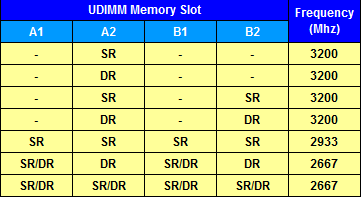I wanna know about this RAM impact performance over Zen 3.
I saw this video where they talk about Ryzen 5 5600X performance differences between 2x8GB and 4x8GB kits.
They saw 4x8GB 3200MHz CL14 and 4x8GB 3600MHz CL16 had the best results, also they talk about somebody saying 2x16GB gives even better results.
Basically this means having a 32GB system, what if I just want 16GB? would 4x4GB be the best for me?
Which RAM specs does 5600X performance depends on?
I saw this video where they talk about Ryzen 5 5600X performance differences between 2x8GB and 4x8GB kits.
They saw 4x8GB 3200MHz CL14 and 4x8GB 3600MHz CL16 had the best results, also they talk about somebody saying 2x16GB gives even better results.
Basically this means having a 32GB system, what if I just want 16GB? would 4x4GB be the best for me?
Which RAM specs does 5600X performance depends on?
Last edited:


